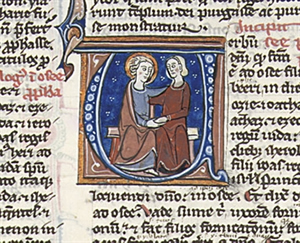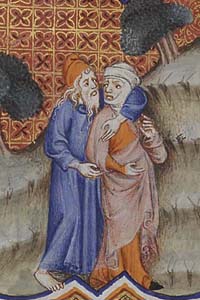"Lord, Teach Us to Pray"
For Sunday July 25, 2010
Lectionary Readings (Revised Common Lectionary, Year C)
Hosea 1:2–10 or Genesis 18:20–32
Psalm 85 or Psalm 138
Colossians 2:6–15 (16–19)
Luke 11:1–13
In his book Jesus: A Biography from a Believer (2010), the British historian Paul Johnson suggests that Jesus had read the literary classics of ancient Greece and Rome. That's conjecture on his part, and impossible to prove. But what is clear is that Jesus described God in ways that contrast sharply with the violent, jealous, and conniving gods of Homer, with Plato's eternal Forms, or with Aristotle's Unmoved Mover.
When the disciples asked Jesus, "Lord, teach us to pray" (Luke 11:1), he didn't respond by suggesting some technique or regimen. He said that genuine prayer depends upon knowing the character of God rather than on human effort. Three readings for this week give us glimpses of the divine nature that encourage us to pray.
 |
15th-century illuminated mss. of Hosea and his wife Gomer. |
In the words of the Lord's Prayer, God is "in heaven." That is, he's infinite, mysterious, and beyond human comprehension. But we should never imply that God is remote or unknowable. Jesus says that God is not only high and lifted up, but that he's near and dear to every person. The first words of the Lord's Prayer capture this perfectly, “Our Father, who art in heaven.” If you want to know what God is like, says Jesus, he's like a tender father.
Paul says the same thing when he writes to the Romans. We should not relate to God as a slave who fears a master, but rather as a child who's in a safe relationship with a protective parent: "Abba, Father" (Romans 8:15, Galatians 4:6). Abba is the Aramaic word that Jesus used that means something like "Papa." The word is used only three times in the New Testament, and conveys a shocking sense of human intimacy with the divine Infinite. It's a word that little children first learning to speak used for their father, and that Jesus himself used to speak to God in Mark 14:36.
The prophet Hosea compares God to a spurned lover. Throughout his prophecy he compares God's head-over-heels love for Israel to the raw emotions of a jilted, aggrieved and passionate suitor. Despite his justified anger at the unfaithfulness of his woman, he simply cannot help himself because he loves her so much, and because of that love he will not give up even a one-sided relationship.
 |
Hosea and Gomer. |
In Hosea, God's word of judgment to Israel is always a next-to-the-last word; it's not his last word. The last word is always one of redemptive love. To communicate the radical nature of his love, God commands Hosea to enact a living parable or a symbolic act. He instructs Hosea to marry a whore named Gomer. The first three chapters of Hosea describe this shocking symbolic act, the point of which is simple but powerful: “Go, love the harlot Gomer; love her just as the Lord loves the Israelites even though they turn to other gods” (3:1).
Israel had prostituted herself in every way imaginable — religiously, politically, and economically, but God still loved her. He longed to woo and allure her, to “speak tenderly to her,” and to “show my love.” Three times he still promises to “betroth Israel to me forever.” In a beautiful play on words the Hebrew reads, literally, “I will show my love to the one called ‘Not my loved one'”(2:14–23).
A few chapters later God longs to heal Israel, bind up her wounds, restore her, and to come to her like the winter rains after a hot, dry summer (6:1–3). Finally, in exasperation, he blurts out some of the most tender and beautiful words of Scripture:
How can I give you up, Ephraim?
How can I hand you over, Israel?
How can I treat you like Admah?
How can I make you like Zeboiim?
My heart is changed within me;
all my compassion is aroused.
I will not carry out my fierce anger,
nor devastate Ephraim again.
For I am God, and not man—
the Holy One among you.
I will not come in wrath. (11:8–9)
Our hope in prayer resides in that one line. Hosea's God is very different from Homer's gods. He's a tender, patient and forgiving God, no matter what we've done, and not a mere human.
Even the ancient story of Sodom and Gomorrah, so infamous for a god of fire and brimstone, portrays God as an extraordinarily lenient judge. Abraham intercedes for Sodom and Gomorrah, but there's a caveat. He asks God, "will you sweep away the righteous with the wicked?" Abraham showed no concern for the wicked, he just wanted God to spare the righteous. God responded: "If I find fifty righteous people in the city of Sodom, I will spare the whole place for their sake" (Genesis 18:26). Abraham kept haggling with God, perhaps wondering how low the crazy moral calculus might go. In the end God promised to spare the entire city if there were but a tiny handful of righteous people.
Because God is like a tender father, a passionate lover, and a lenient judge, Jesus invites us to pray. Keep asking, keep seeking, keep knocking, he tells us. If a person will answer the door at midnight when a visitor knocks, how much more will God respond to our prayers? And when a child asks for basic nourishment like a fish or an egg, no parent would ever give him something poisonous like a snake or scorpion. How much more will God give good gifts to his children, says Jesus.
The psalms for this week thus encourage us to trust ourselves to the loving providence of a good God: "The Lord will fulfill his purpose for me. . . . The Lord will indeed give what is good" (Psalm 138:8; 85:12).
 |
Hosea and Gomer. |
In the Sayings of the Desert Fathers, there's a story about Macarius the Great (born c. 300), a former camel driver. One day someone asked him how to pray. "There is no need at all to make long discourses," he advised. "It is enough to stretch out one's hands and say, 'Lord, as you will, and as you know, have mercy.' And if the conflict grows fiercer say, 'Lord, help!' He knows very well what we need and he shows us his mercy."
Another desert monk, Evagrius Ponticus (345–399), contemplated his own misguided desires in light of the Lord's Prayer. In his younger years Evagrius fell in love with the wife of an imperial official in Constantinople. "The woman loved him in return," writes Palladius, whereas Evagrius "wished to break off with the woman, who by now was eager and frantic, but he could not do so, so caught up was he in the bonds of concupiscence."
After a disturbing dream, and on the advice of the famous Melania, one of the wealthiest women of her time, Evagrius fled to the desert. For the last sixteen years of his life one of the greatest and most refined Christian intellectuals of his day submitted himself to the unlettered Coptic peasants of the harsh Egyptian desert. Today he's recognized as one of the most distinguished practitioners and guides of the early desert Christians.
In his Chapters on Prayer we glimpse some of what Evagrius learned in the desert: "Pray not to this end, that your own desires be fulfilled. You can be sure they do not fully accord with the will of God. Once you have learned to accept this point, pray instead that 'thy will be done' in me. In every matter ask him in this way for what is good and for what confers profit on your soul, for you yourself do not seek this so completely as he does."
Image credits: (1) Christies.com; (2) TopTenz.net; and (3) SchoolHouseWidgets.com.





